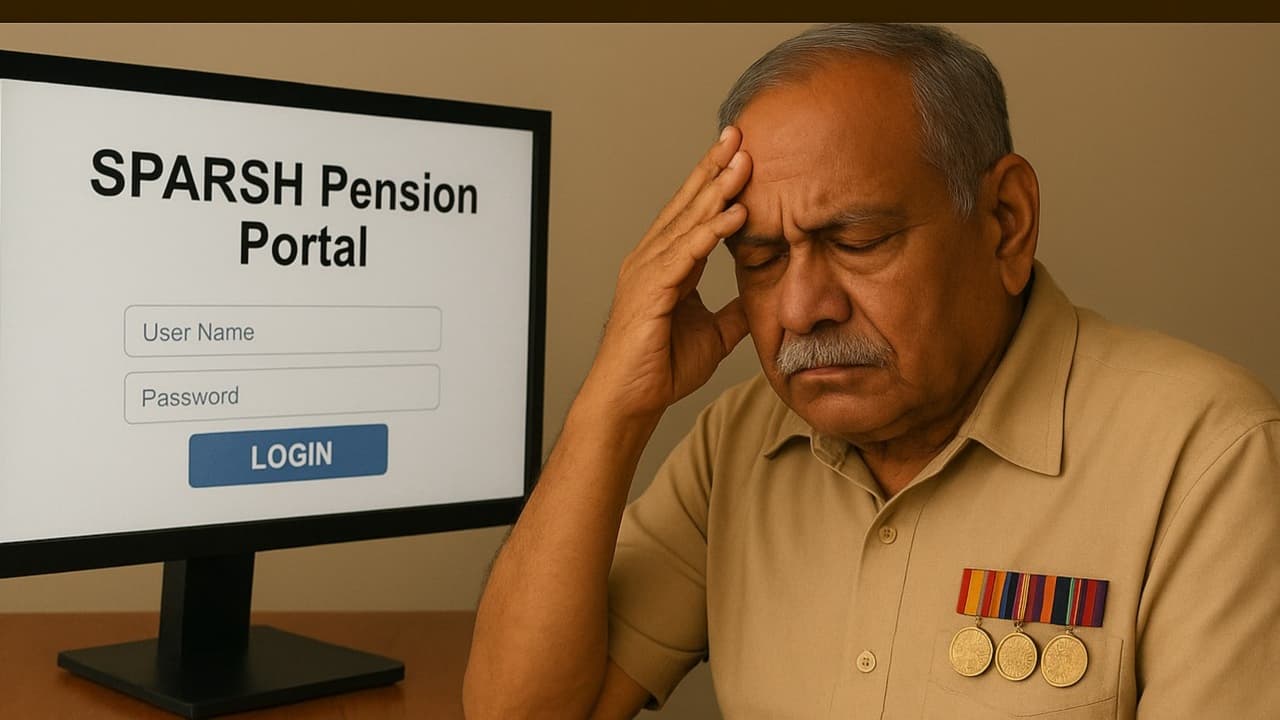When the Defence Ministry’s System for Pension Administration – Raksha (SPARSH) platform was launched, it had promised to modernise and streamline pension disbursement for military veterans in India.
When the Defence Ministry’s System for Pension Administration – Raksha (SPARSH) platform was launched, it had promised to modernise and streamline pension disbursement for military veterans in India. By moving from bank-based disbursing agencies to a centralised, digital platform managed by the Defence Accounts Department (DAD), SPARSH was to ensure timely, transparent, and error-free payments.
However, the reality for thousands of veterans and family pensioners has been starkly different. SPARSH’s systemic failures have left many without pensions for months, creating financial hardship and deep resentment within the ex-servicemen (ESM) community.
From Vision to Frustration
SPARSH, with its promise of direct credit of pensions, real-time updates, seamless grievance redressal, and self-verification, was to be a game-changer. Yet, instead of simplifying lives, its rollout has exposed glaring issues:
* Delayed pension credits: Many veterans have reported non-receipt of monthly pensions for two to six months, often without prior intimation.
* Failed verification procedures: The mandated digital life certificate and SPARSH identification process have locked out elderly pensioners who lack digital literacy or live in remote areas.
– Grievance redressal bottlenecks: Multiple complaints remain unresolved for weeks, as the helpdesk system is often unresponsive or ill-equipped to handle complex cases.
The Human Cost of Digital Gaps
The impact of these failures must be understood in terms of human cost. For a retired soldier or widow dependent solely on pension income, a missed payment is a direct assault on livelihood and dignity.
Many elderly pensioners are not tech-savvy and struggle with navigating the SPARSH portal. Internet connectivity issues in rural and hill areas, where a significant portion of veterans reside, have worsened the problem.
Furthermore, family pensioners, especially widows of jawans, face additional hurdles. In cases where the veteran has passed away, updating records in SPARSH has proved painfully slow, delaying the initiation of family pensions for months. This bureaucratic inertia forces dependents into financial distress at the most vulnerable time.
Why SPARSH is Failing?
* Poor Implementation Strategy: The move from legacy systems to SPARSH was abrupt, with inadequate preparatory groundwork. Large-scale onboarding happened without ensuring that pensioners were trained or informed.
* Over-Centralisation: Moving entirely to a single, centralised platform has reduced flexibility. Unlike bank disbursing agencies that had local points of contact, SPARSH operates remotely, leaving no in-person assistance for pensioners.
* Inadequate Technical Infrastructure: Server downtimes, login failures, and data mismatches plague the portal. Even minor technical glitches can halt pension credits for thousands.
* Limited Human Support: The helpline numbers are often inaccessible or manned by personnel without the authority to resolve payment issues, leading to a cycle of repeated calls and no results.
Impact on Veterans’ Morale
Defence veterans, who have served the nation with honour, expect that the state will uphold its commitment to their welfare. SPARSH’s failures have shaken confidence in the system and widened the civil-military disconnect.
Many veterans’ associations have expressed anger at what they perceive as a cost-cutting exercise prioritised over welfare, arguing that the system was rolled out without adequate safeguards.
Restoring Trust
If the Defence Ministry is serious about protecting veterans’ dignity, urgent corrective action is required: Hybrid Disbursal Model: Re-introduce bank-based pension disbursement as an optional alternative, especially for elderly and digitally challenged veterans.
* Dedicated Veteran Facilitation Centres: Establish district-level pension facilitation offices to offer in-person support and assist with SPARSH procedures.
* Strengthen Technical Backbone: Upgrade server capacity, fix data integration errors, and ensure platform uptime to prevent payment disruptions.
* Simplify Verification Processes: Allow offline life certificate submissions and make biometric authentication optional, not mandatory.
* Transparent Communication: Inform pensioners proactively about delays, procedural changes, or required actions through SMS and postal letters.
* Accountability in Grievance Redressal: Set strict timelines for resolving payment issues, with escalation mechanisms that reach senior defence accounts officials.
The SPARSH initiative was envisioned as a leap forward in pension management for India’s defence veterans. Instead, its poor execution has turned it into a source of anxiety, financial strain, and anger. Technology can indeed make processes more efficient, but only when it is inclusive, user-friendly, and supported by strong human assistance.
A nation that owes its security to the sacrifices of its armed forces must ensure timely and dignified pension delivery. This is a moral obligation. The SPARSH system’s failures must be addressed decisively before they erode the trust of those who have worn the uniform.
(Ashu Mann is an Associate Fellow at the Centre for Land Warfare Studies. He was awarded the Vice Chief of the Army Staff Commendation card on Army Day 2025. He is pursuing a PhD from Amity University, Noida, in Defence and Strategic Studies. His research focuses include the India-China territorial dispute, great power rivalry, and Chinese foreign policy.)
Disclaimer: The opinions expressed are solely those of the author and do not reflect the views or stance of the organization. The organization assumes no responsibility for the content shared.
